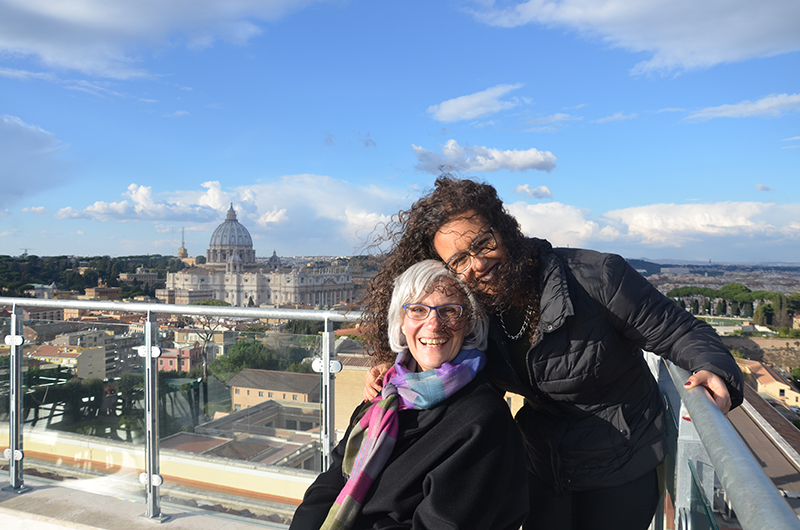Joyce Angio, an experienced ESL teacher from Canada, recently finished teaching English in a homestay in Italy with Greenheart Travel. Read on for her advice about living with a host family, insight on balancing time for teaching and exploring, as well as ways to make the transition abroad smooth.
What are some tips for living with a host family?
“I know this is going to sound trite, but bring an open mind, the ability to adapt, and the desire to learn.”
Keep your eyes and ears open, watch what is being done around you, and take your cues from what you see. For example, I apparently transgressed a cultural rule that says an invitation to dinner is accepted no matter if we want to go or not.
Another example of a balancing act is translation: once it became known that I was an English teacher back home, friends and neighbors of my host family seemed to take it for granted that I’d be their de facto translator, homework corrector, resumé writer, and grammar teacher.
How did you find a balance between your teaching and living schedules?
In general, it was easy for me to find a balance between the two schedules. My host mother was a single mom raising her 16-year-old daughter on the outskirts of Rome. She left the house very early to go to work, and my host sister left for school soon after. That’s when I could take off to explore Rome.
Since my host mother, Asia, made my host sister, Feirouz, do her “important” homework right after school, I didn’t need to get back to our neighborhood until late in the afternoon.
Our English lesson was supposed to come once all her other homework was done, and that usually meant after dinner. But, honestly, by 9:30 at night, we were both too tired to begin our three hours of “instruction”. So, we renegotiated the requirements.
Feirouz and I agreed to speak only in English, including text messages during the day and on weekends when I was gone. One year later, I often have my morning coffee while texting with Feirouz since she’s getting home from school as I’m getting up. In fact, in a few weeks, I’ll be going back to stay with them for a few days!

One aspect I wasn’t prepared for was playing the role of referee. My homestay mother admitted that when she and her daughter were choosing candidates for the program, they had to choose between a young woman and myself.
She chose my profile for two reasons: she wouldn’t have the potential discipline issues she foresaw with a 21-year-old girl in her house. And she thought a woman “my age” would be a “grandmotherly” figure for her daughter. To her surprise, though, Feirouz and I hit it off immediately. Let’s just say I can easily channel my inner 16-year-old.
Feirouz started calling me her “sister” within a week of my arrival. She would knock on the door of my room before going to bed. We’d sit and chat about her day, what happened at school, which friend betrayed another, which boy’s girlfriend got mad at her because she was laughing with him in the hall between classes, etc.
I could give her the advice of a girl who’d already been there as well as the point of view of a mother who was looking at the situation with a different pair of eyes now. I could understand her often lackadaisical attitude towards school, yet warn her of the fast-approaching consequences of not putting her studies first.
What advice do you have for first time teachers?
As a career ESL teacher with lots of traveling experience behind me, the teaching aspect of the program wasn’t the challenging part. But, had I been a young, inexperienced teacher, I might have felt overwhelmed by the task at hand.
I’d tell new teachers to break down the language learning aspects into their smaller parts: work a little on pronunciation, intonation, vocabulary, sentence structure, and then texts of whatever length is appropriate for their host family’s level of mastery. We’re incredibly lucky to have the Internet at our fingertips because everything we need is just a click away.

How do you prepare for moving abroad?
“The idea of leaving your friends and home behind to live in another country with “strangers” is daunting. But, if we take it a day at a time, our adaptation skills should kick in by the end of the first week.”
Just as I mentioned above with respect to teaching a second or foreign language, by “breaking down” the homestay experience into its smaller parts, we can pretty much handle anything. Baby steps.
Despite lots of travel experience, I’m a terrible “transitioner”. I still have to constantly balance my need for change and adventure with my need to have a comfort zone. To combat the anxiety created by leaving everything that’s familiar behind, I do the following:
- Google walk my destination before arrival
- Study the transportation system of where I’ll be going
- Look out for articles, blogs and Facebook pages on the location I plan to live
- Generally just scope out the place – anything to give me a greater sense of familiarity and offset the shock of being transplanted into unfamiliar territory
I also try to include in my budget an “emergency” stash so I can check into a nice hotel once in awhile when I’m feeling overwhelmed and need to recuperate!
” Is a homestay stressful? Yep. Anything new and unfamiliar is. Is it worthwhile?. Definitely. I’m already planning the next stay!”

Very helpful and enlightening information Joyce. I am in the early stages of my first Italian Homestay Abroad this fall. Your insight on the daily life, routines, and teaching methods is invaluable.
Thank you for taking time to comment, Jeff! Joyce has been a fantastic, resourceful member of the Greenheart Travel community. Let us know if you have any specific questions as you prepare for your homestay!